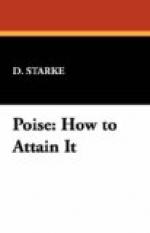Deception is the necessary corollary of this, and one that very soon becomes changed into spite. The disappointment of being misunderstood must inevitably lead us to condemn those who do not comprehend us. Our shyness will be increased at this and we shall end by disbelieving ourselves in the qualities that we find other people ignoring in us.
From this condition of discouragement to that of mental inertia it is but a step, and many worthy people who lack poise have rapidly traveled this road to plunge themselves into the obscurity of renunciation.
They are like paralytics. Like these poor creatures they have limbs which are of no service to them and which from habitual lack of functioning end by becoming permanently useless.
If their nature is a bad one they will have still more reason to complain of this lack of poise, with its train of inconveniences of which we have been treating, that will leave them weakened and a prey to all sorts of mental excesses which will be the more serious in their effects for the fact that their existence is known to no one but the victims.
Instead of admitting that their lack of poise-due to the various faults of character we have been discussing—is the sole cause of the apparent ostracism from which they suffer, they indulge in accusations against fate, against the world, against circumstances, and grow to hate all those who have succeeded, without being willing to acknowledge that they have never seriously made the attempt themselves.
Only those return home with the spoils who have taken part in the battle, have paid with their blood and risked their lives.
The man who remains in hiding behind the walls of his house can hardly be astonished that such honors do not come his way.
Life is a battle, and victory is always to the strong. The timid are never called upon to take their share of the booty. It becomes the property of those who have had the force to win it, either by sheer courage or by cautious strategy, for real bravery is not always that which calls for the easy applause of the crowd.
It is found just as much among those who have the will-power to keep silent as to their plans and to resist the temptation to actions which, while satisfying their desire for energetic measures may destroy the edifice that they have so carefully constructed.
It is for this reason that enthusiasm may be considered with justice as an enemy of poise.
Those who act under the domination of an impulse born of a too-vivid impression are rarely in a state of mind that can be depended upon to judge sanely and impartially. They nearly always overshoot the mark at which they aim. They are like runners dashing forward at such a high speed that they can not bring themselves to a sudden stop. Habitual enthusiasm is also the enemy of reflection. It is an obstacle to that reason from which proceed strong resolves, and one is often impelled, in observing people who are fired with too great an ardor, to thoughts of the fable of the burning straw.




